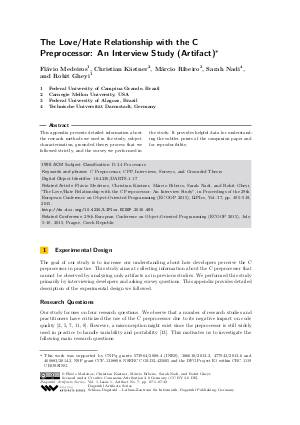The Love/Hate Relationship with the C Preprocessor: An Interview Study (Artifact)
Authors Flávio Medeiros, Christian Kästner, Márcio Ribeiro, Sarah Nadi, Rohit Gheyi
-
Part of:
Issue:
Special Issue of the 29th European Conference on Object-Oriented Programming (ECOOP 2015)
Part of: Volume: DARTS, Volume 1 (ECOOP 2015)
Part of: Conference: European Conference on Object-Oriented Programming (ECOOP)
Part of: Journal: Dagstuhl Artifacts Series (DARTS) - License:
 Creative Commons Attribution 3.0 Germany license
Creative Commons Attribution 3.0 Germany license
- Publication Date: 2015-10-30
Artifact Description

PDF
DARTS.1.1.7.pdf
- Filesize: 0.7 MB
- 32 pages
Document Identifiers
Subject Classification
Keywords
- C Preprocessor
- CPP
- Interviews
- Surveys
- and Grounded Theory
Metrics
- Access Statistics
-
Total Accesses (updated on a weekly basis)
0Document
0Metadata
Abstract
This appendix presents detailed information about the research methods we used in the study, subject characterization, grounded theory process that we followed strictly, and the survey we performed in the study. It provides helpful data for understanding the subtler points of the companion paper and for reproducibility.
Cite As Get BibTex
Flávio Medeiros, Christian Kästner, Márcio Ribeiro, Sarah Nadi, and Rohit Gheyi. The Love/Hate Relationship with the C Preprocessor: An Interview Study (Artifact). In Special Issue of the 29th European Conference on Object-Oriented Programming (ECOOP 2015). Dagstuhl Artifacts Series (DARTS), Volume 1, Issue 1, pp. 7:1-7:32, Schloss Dagstuhl – Leibniz-Zentrum für Informatik (2015)
https://doi.org/10.4230/DARTS.1.1.7
BibTex
@Article{medeiros_et_al:DARTS.1.1.7,
author = {Medeiros, Fl\'{a}vio and K\"{a}stner, Christian and Ribeiro, M\'{a}rcio and Nadi, Sarah and Gheyi, Rohit},
title = {{The Love/Hate Relationship with the C Preprocessor: An Interview Study (Artifact)}},
pages = {7:1--7:32},
journal = {Dagstuhl Artifacts Series},
ISSN = {2509-8195},
year = {2015},
volume = {1},
number = {1},
editor = {Medeiros, Fl\'{a}vio and K\"{a}stner, Christian and Ribeiro, M\'{a}rcio and Nadi, Sarah and Gheyi, Rohit},
publisher = {Schloss Dagstuhl -- Leibniz-Zentrum f{\"u}r Informatik},
address = {Dagstuhl, Germany},
URL = {https://drops.dagstuhl.de/entities/document/10.4230/DARTS.1.1.7},
URN = {urn:nbn:de:0030-drops-55162},
doi = {10.4230/DARTS.1.1.7},
annote = {Keywords: C Preprocessor, CPP, Interviews, Surveys, and Grounded Theory}
}
Author Details
Related Article
- Flávio Medeiros, Christian Kästner, Márcio Ribeiro, Sarah Nadi, and Rohit Gheyi, "The Love/Hate Relationship with the C Preprocessor: An Interview Study", in 29th European Conference on Object-Oriented Programming (ECOOP 2015), LIPIcs, Vol. 37, pp. 495-518, 2015. https://doi.org/10.4230/LIPIcs.ECOOP.2015.495
References
-
Steve Adolph, Wendy Hall, and Philippe Kruchten. Using grounded theory to study the experience of software development. Empirical Software Engineering, 16(4), 2011.

-
Ira Baxter and Michael Mehlich. Preprocessor conditional removal by simple partial evaluation. In Procedings of the Working Conference on Reverse Engineering, WCRE. IEEE, 2001.

-
JulietM Corbin and Anselm Strauss. Grounded theory research: Procedures, canons, and evaluative criteria. Qualitative Sociology, 13(1), 1990.

-
Don A. Dillman, Jolene D. Smyth, and Leah Melani Christian. Internet, Phone, Mail, and Mixed-Mode Surveys: The Tailored Design Method. Wiley, 2014.

-
Michael Ernst, Greg Badros, and David Notkin. An empirical analysis of C preprocessor use. IEEE Transactions on Software Engineering, 28(12), 2002.

-
Uwe Flick. An Introduction to Qualitative Research. SAGE Publications, 2014.

-
Alejandra Garrido and Ralph Johnson. Analyzing multiple configurations of a C program. In Proceedings of the International Conference on Software Maintenance, ICSM. IEEE, 2005.

-
Christian Kästner, Paolo Giarrusso, Tillmann Rendel, Sebastian Erdweg, Klaus Ostermann, and Thorsten Berger. Variability-aware parsing in the presence of lexical macros and conditional compilation. In Proceedings of the Object-Oriented Programming Systems Languages and Applications, OOPSLA. ACM, 2011.

-
Steinar Kvale. InterViews: An Introduction to Qualitative Research Interviewing. SAGE Publications, 1996.

-
Jörg Liebig, Sven Apel, Christian Lengauer, Christian Kästner, and Michael Schulze. An analysis of the variability in forty preprocessor-based software product lines. In Proceedings of International Conference on Software Engineering, ICSE. ACM, 2010.

-
Jörg Liebig, Christian Kästner, and Sven Apel. Analyzing the discipline of preprocessor annotations in 30 million lines of C code. In Proceedings of the International Conference on Aspect-Oriented Software Development, AOSD. ACM, 2011.

-
Flávio Medeiros, Márcio Ribeiro, Rohit Gheyi, and Baldoino Fonseca. A catalogue of refactorings to remove incomplete annotations. Journal of Universal Computer Science, 2014.

-
Henry Spencer and Geoff Collyer. \#ifdef considered harmful, or portability experience with C news. In USENIX Annual Technical Conference, 1992.

